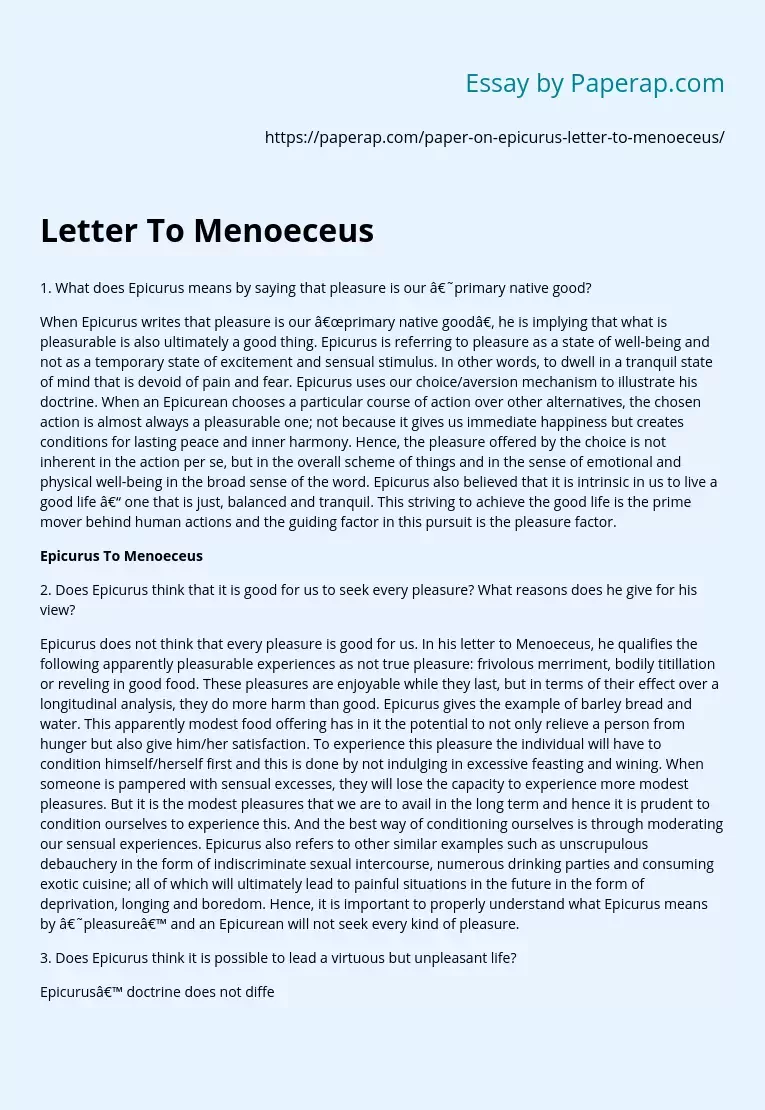Letter To Menoeceus
1. What does Epicurus means by saying that pleasure is our ‘primary native good?
When Epicurus writes that pleasure is our “primary native good”, he is implying that what is pleasurable is also ultimately a good thing. Epicurus is referring to pleasure as a state of well-being and not as a temporary state of excitement and sensual stimulus. In other words, to dwell in a tranquil state of mind that is devoid of pain and fear. Epicurus uses our choice/aversion mechanism to illustrate his doctrine.
When an Epicurean chooses a particular course of action over other alternatives, the chosen action is almost always a pleasurable one; not because it gives us immediate happiness but creates conditions for lasting peace and inner harmony. Hence, the pleasure offered by the choice is not inherent in the action per se, but in the overall scheme of things and in the sense of emotional and physical well-being in the broad sense of the word. Epicurus also believed that it is intrinsic in us to live a good life – one that is just, balanced and tranquil.
This striving to achieve the good life is the prime mover behind human actions and the guiding factor in this pursuit is the pleasure factor.
Epicurus To Menoeceus
2. Does Epicurus think that it is good for us to seek every pleasure? What reasons does he give for his view?
Epicurus does not think that every pleasure is good for us. In his letter to Menoeceus, he qualifies the following apparently pleasurable experiences as not true pleasure: frivolous merriment, bodily titillation or reveling in good food.
These pleasures are enjoyable while they last, but in terms of their effect over a longitudinal analysis, they do more harm than good. Epicurus gives the example of barley bread and water. This apparently modest food offering has in it the potential to not only relieve a person from hunger but also give him/her satisfaction. To experience this pleasure the individual will have to condition himself/herself first and this is done by not indulging in excessive feasting and wining. When someone is pampered with sensual excesses, they will lose the capacity to experience more modest pleasures. But it is the modest pleasures that we are to avail in the long term and hence it is prudent to condition ourselves to experience this. And the best way of conditioning ourselves is through moderating our sensual experiences. Epicurus also refers to other similar examples such as unscrupulous debauchery in the form of indiscriminate sexual intercourse, numerous drinking parties and consuming exotic cuisine; all of which will ultimately lead to painful situations in the future in the form of deprivation, longing and boredom. Hence, it is important to properly understand what Epicurus means by ‘pleasure’ and an Epicurean will not seek every kind of pleasure.
3. Does Epicurus think it is possible to lead a virtuous but unpleasant life?
Epicurus’ doctrine does not differentiate between that which is virtuous and that which is a path to pleasure. Conversely, any action of ours that is based on a striving for pleasure is undeniably virtuous. According to Epicurus, “It is impossible to live the pleasant life without also living sensibly, nobly and justly and conversely it is impossible to live sensibly, nobly and justly without living pleasantly”. Hence the author is equating those cherished virtues of sensibility, nobility and justice to the concept of pleasure. This assertion can be extended to mean that only that which is sensible which brings greater pleasure; only that which is just which is informed by a sense of pleasure; only that is noble which is based on our primary instinctive good. To support this doctrine, Epicurus poses to the reader a few rhetoric questions of the order “Can you think of anyone more moral than the person who has devout beliefs about the gods, who is consistently without fears about death, and who has pondered man’s natural end?”, etc.
4. Do you agree with him?
The central doctrines of the Epicurean system of philosophy are grounded on human universalities and observations of common human behavior that it is difficult to disagree with any of them. We are likely to benefit if we were to embrace the Epicurean doctrines as guidelines for conducting our own lives. In some ways, the Epicurean thought has semblances to Indian philosophy and Asceticism. But Asceticism talks nothing of pleasure and in that it is markedly distinct from Epicureanism which can be applied in the context of everyday life. On the other extreme, it is a mistake to equate Epicureanism to Hedonism, for the latter is prone to lead to pleasures based on mental perversions. Hence, it is my personal conviction that an Epicurean way of life, having based its doctrines on principles of prudence and moderation, will be a virtuous life.
Letter To Menoeceus. (2019, Dec 05). Retrieved from https://paperap.com/paper-on-epicurus-letter-to-menoeceus/

